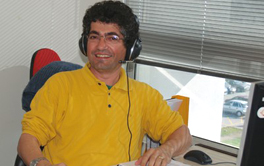H A V E Y O U R S A Y
Over-appreciating that which belongs to someone else 
By Hermes Monego*
When I was invited to write an article for BIP, I was immediately drawn to the theme: appreciating what others do as opposed to what we do. To me, this seems to be a Latin problem, especially among the Portuguese and the Brazilians, the two realities I know.
I’ll explain. Is the research carried out in countries such as England, Germany, Japan or United States better than the research we do? Yes. In a way, this is partially true, but we must not forget that most of those brains may not even be from citizens from that particular country. In fact, they’re most likely to be foreigners, perhaps motivated by the opportunities that their country of origin could not provide for any particular reason.
The reasons for this can go from lack of resources or even knowledge absorption and it seems to me that this last reason is the most relevant these days. As far as financial benefits are concerned, great powers can provide researchers with resources so that they can carry out their research, but merit is personal.
What I would like to say is that great findings can be traced, but knowledge can cross borders. I believe that we must set all this aside and start thinking that what we do is as important as what everybody else does, particularly because we did it. Don’t you agree?
*Collaborator at the Telecommunications and Multimedia Unit (UTM)
THE READER’S ADVISER COMMENTS
Hermes is the mercury Greek god with wings on his feet, protector of traders. He is the inventor of the lira, of the Pan flute and the messenger of divine wills. He was gifted with the power of foretelling and so I ask you: what do you see in our future?
Truthfully, one could argue that I found a little bit of the past in your text, particularly in that romantic nostalgia where discoveries are worth it on their own. That is what happened for centuries until science finally blended with technology, thus becoming one. In fact, Da Vinci was probably the last of the eclectic scientists in a time where the word “scientist” had not been invented yet. From the emergence of rational and positive science, we can no longer identify a citizen that has combined several distinct areas of knowledge and art, as well as the art of designing and creating objects. Then, Leonardo was an early-engineer.
The Portuguese and Brazilian cultures suffer from the same common syndrome, which is some kind of original sin. It is the result of a long-lasting rural and trade society. Culturally, the survival niche of the Portuguese has always been trade instead of the industry, trade instead of production. Despite the Empire’s glories, this was an empire of grocers and miners, as opposed to an empire of added value producers. India was used to trade pepper for fabric and bad wine, while Brazil was used for the extraction of ore for profit. The only existing production was the agricultural production.
For this civilisation to survive, the need to become crafty was evident, as well as the ability to create empathy, to adapt to the local conditions and to understand the channels of emotion. There was no need to acquire knowledge. A large power can afford to have enemies, while a small one cannot afford to make enemies or renounce having many friends. To be rural is to produce the basic needs without threatening anyone. One the other hand, being a trader is to give people the feeling that you’re useful to others.
In a way, Portugal didn’t know how to be an empire and Brazil doesn’t know how to be one yet. Our civilisation, Portuguese and Brazilian, took too long to industrialise. Free thinking was killed by the inquisition. Nevertheless, one can argue that the Holy Office found a fertile land to settle.
This is why we value far more the cunning devices or the tricks, rather than the system.
Well, the fellow-countrymen, the ones you are praising, the ones who succeed in the countries that you mentioned, all of them industrialised (was it random?), do not benefit from the fact that they are smarter than the ones who stay behind. They benefit from a system that materialises their knowledge. It’s a cultural and social system.
We criticise ourselves too much and that is unfair since we Portuguese and Brazilian are here for almost one thousand years, and we are the fruit of the same original vine-plant. We cannot say the same of other peoples that grow proud with their temporary superiority. Some virtue will come from our way of being, don’t you think?
In the meantime, a little bit of modesty wouldn’t do us any harm. Sometimes, we show off the arrogance of the humble. So, saying bad things about ourselves is a showing off boldness and those who do it seem to be claiming the superiority to impose judgements, even for their own cause. We are not that good that we can classify ourselves as being bad.
What we are missing still is a system that is guided to multiply the effect of knowledge. Therefore, our own knowledge will obtain more social respect and, finally, it will be more valued than the cunningness of the trader.
Thus, we need to understand how we can take advantage of the production cultures so that we can increase our ability as a culture of movement. We must seek, very much like Singapure did (without trying to make an excessively close comparison), the virtuous summary of the characteristics of two civilisations.
|

